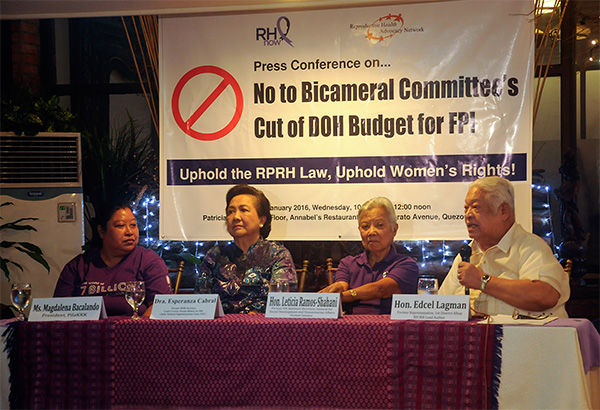Who eviscerated the Reproductive Health Law?
Today, even after 14 years of protracted struggle, reproductive health (RH) remains heavily contested in this country. For the most part, the Catholic Church—led by the Catholic Bishops Conference of the Philippines—vehemently opposes the implementation of the law, claiming that the use of modern contraceptives is tantamount to using abortifacients—which remains illegal under the Revised Penal Code.
Even when the policy was being deliberated in Congress, party affiliations and feminist groups could not guarantee whether the legislators would support or oppose the passage of the law. There was much uncertainty about the proposed law’s effects: would it pave the way to legalizing abortion? Or would it improve family planning, save women from complications due to pregnancy, and reduce—if not altogether eliminate—teenage pregnancy itself?
Opponents of the RH law claimed that it violated the anti-abortion provisions in the Constitution. After lengthy deliberations, the Supreme Court deemed certain aspects to be unconstitutional. The law was scaled back, much to the disadvantage of women: health care workers were no longer required to maintain discretion in non-emergency situations, for example. Access to reproductive health care in non-life threatening circumstances would now require the consent of the spouse. Similarly, minors were required to show parental consent to seek medical care in the event of pregnancy or miscarriage. But the Court upheld the rest of the law, vindicating almost a decade and a half of vigorous lobbying by reproductive health advocates.
For them, the Responsible Parenthood and Reproductive Health Law was a historic first step forward for all women in the Philippines, empowering them to make their own decisions about their health and families, and participate equally in society.
The only thing left: to fund and fully implement the program. But before it could even take that next step, a major obstacle took root.
Last month, the Bicameral Conference Committee (Bicam) of Congress slashed P1 billion from the budget of the Department of Health (DOH), which had been targeted for the purchase of Family Planning products—condoms, birth control pills, intrauterine devices, and contraceptive injectables. The cut resulted in the reduction of the Family Health and Responsible Parenting budget from P3.27 billion to only P2.27 billion. It effectively bars poor women from access to contraceptives, thereby upending a major provision of the law.
Health Secretary Janette Garin explained: “This will have a huge effect since a lot of mothers depend on what the Department of Health provides.”
RH advocates were caught off guard by the budget cut. The Bicam ratified the 2016 General Appropriations Act on December 14—at a time when most people were already heading out for the holidays. Even more troubling is the fact that there does not seem to be any documentation of the decision to cut the budget itself.
 The RH Now press conference on the P1B budget cut: Magdalena Bacalando of PilaKKK, former DOH Secretary Dra. Esperanza Cabral, former Senator Leticia Ramos-Shahani, and former Albay 1st District Representative and RH Bill lead author Edcel Lagman. HDPRC/Paolo Rayco
The RH Now press conference on the P1B budget cut: Magdalena Bacalando of PilaKKK, former DOH Secretary Dra. Esperanza Cabral, former Senator Leticia Ramos-Shahani, and former Albay 1st District Representative and RH Bill lead author Edcel Lagman. HDPRC/Paolo RaycoThe Purple Ribbon for RH Movement—a broad coalition composed of more than a hundred RH champions and advocates—were understandably upset and angry at the Bicam’s action, calling it arbitrary and unjust. Advocates have warned that it would push millions of poor women into unplanned pregnancies, illegal abortion, and even maternal death. They also explained that it would further thrust millions of impoverished families into greater destitution.
This was echoed by Emmeline Versoza, the Executive Director of the Philippine Commission for Women: “Providing free access to family planning commodities to poor women is meant to help address our country’s high maternal mortality rate. We can no longer allow poor mothers to die of pregnancy and child birth complications when we can provide them with free options.” Today, the country’s maternal mortality rate continues to rise at 221 deaths per 100,000 live births.
The RH Law was supported by a large majority of the nation’s population. What the anti-RH Senators in the Bicam managed to do with this budget cut was—without public knowledge or support—to return contraception availability from its legislated state as a public good back to the status quo ante—rendering it an “excludable” public good. Women with sufficient money have taken advantage of reproductive health and contraception all along—and continue to do so. But poor women are now excluded from that public good once again—despite the intentions of the law as passed and signed. Clearly, what happened was an attack on poor women.
So what exactly led to such a budget fiasco? According to Senator Loren Legarda, chair of the Senate Committee on Finance, the budget cut stemmed from two things. First, the DOH has historically been somewhat slow in utilizing its allotted funds, having allegedly spent only 29% of its RH budget by June 2015. This prompted the committee to transfer funds to the Department of National Defense, state universities, and other sections within the Health Department.
Second, and even more problematic, some in the committee considered contraceptives to be abortifacients. Senator Tito Sotto—known for his fierce opposition to the RH law—explained that the cuts covered contraceptives, including condoms and injectables, which should be classified as abortifacients. As such, they would be banned—allegedly covered by the Temporary Restraining Order (TRO) of the Supreme Court.
RH advocates and the Health Department countered that both explanations were patently untrue. The Health Department reported that 90% of the funds for contraceptives had been utilized by the end of 2015, leaving them with only P87 million for 2016—barely enough for the needs of 6.7% or 80,000 women out of over 4 million with unmet needs for family planning services.
 Health Secretary Janette P. Loreto-Garin speaks on the budget cut during a press conference at DOH last January 13. HDPRC/Paolo Rayco
Health Secretary Janette P. Loreto-Garin speaks on the budget cut during a press conference at DOH last January 13. HDPRC/Paolo RaycoThe DOH also rejected Sen. Sotto’s claim, pointing out that the Supreme Court TRO only covered contraceptive implants, which were not included in the DOH’s budget request.
Frustrated, pro-RH legislators like Senators Pia Cayetano and Miriam Defensor Santiago protested against the lack of transparency and consultations surrounding the budget cut. RH advocates, including former legislators and Health Department officials, recently held a press conference, alleging that Congress—particularly the Senate—had violated the right of women to reproductive health by cutting the RH Law’s budget. They also questioned how Congress could have violated the very law it had enacted.
Striking a more diplomatic tone, Health Secretary Garin, with the support of the President, has proposed another approach to resolving the issue. As a result of her meeting with the Senate Committee on Finance and the Department of Budget and Management, part of the funding will be restored. Some P337.5 million originally intended to purchase additional blood pressure apparatuses for barangay health workers will now be reallocated for the procurement of family planning commodities. Still, this is a mere fraction of the original P1 billion.
Senator Legarda has also assured the Health Department that she will make representations with the next President to allow the use of DOH savings for the purchase of family planning commodities. The Health Department also said that they will look for other sources of funds, which include the assistance of international developmental partners.
But this positive approach notwithstanding, RH advocates—and the public as a whole—have the right to ask hard questions, or at least to attempt a forensic reconstruction of how the budget cut came about in the first place: where were the RH supporters from the Legislative and Executive branches—as well as the NGOs—when the Bicameral committee unilaterally decided on the budget cut? For that matter, where were the known RH supporters and Liberal Party stalwarts, who were also members of the Bicam itself (Senators Bam Aquino and Ralph Recto; Representatives Isidro Ungab, JC Rahman Nava, and Romero Quimbo) at the time? How can two senators—Legarda and Sotto—legally constitute a Bicam quorum?
Tactically, could the DOH have incorporated the budget for contraceptives under a bigger—and more innocuous—heading, like “Child and Family Health,” so that members of the Senate and the House could not tinker with it? And what is going to happen to those patients who need the blood pressure apparatuses, now that this budget will be realigned directly for family planning supplies? Indeed, by restoring a little more than one third of the original budget for contraceptives, isn’t the injustice of the decision compounded by then taking the money away from the monitoring of blood pressure, given the extremely high incidence of hypertension in this country? For that matter, should the Philippines even be looking for foreign funding to implement a landmark law this administration—with the help of civil society—worked so hard to pass? Can a supplemental budget from the President’s office be sourced instead? Finally, did the Catholic Church play a role in blocking these funds in the run-up to the 2016 elections?
What lessons can now be learned from this recent event? Among other things, we see how passing a bill into law—however long and tortuous the process—is only half the battle. Implementing the law requires constant vigilance, especially during the budget process. In the coming elections, we need to hold candidates’ feet to the fire and demand that they commit themselves to supporting—and fully funding—the mandates of the RH Law and upholding the reproductive rights of all women.
- Latest
- Trending






















